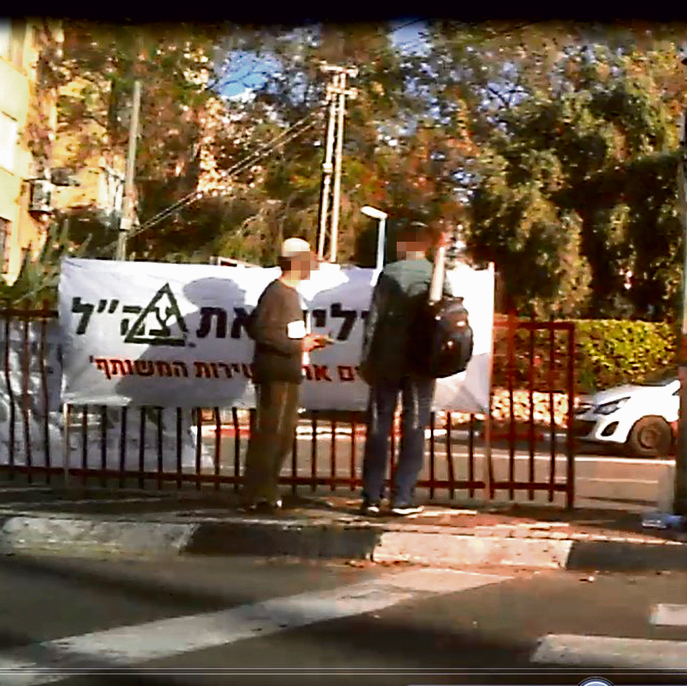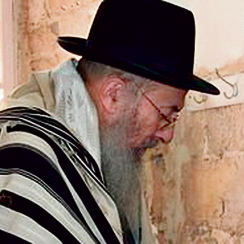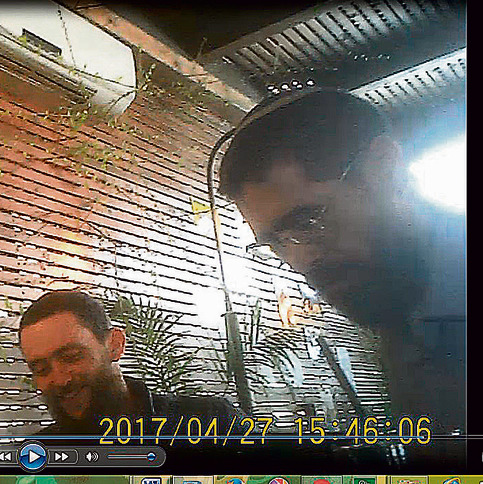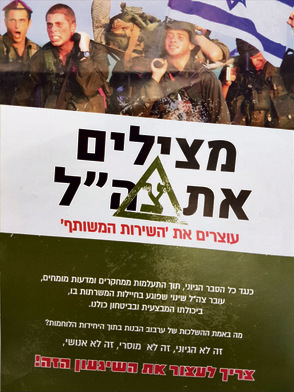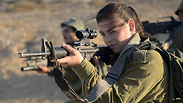

Gender separation front targets IDF
An aggressive campaign against joint service of men and women in combat units has been taking place in the past year on Israel streets and on social media under the slogans ‘Saving the IDF’ and ‘Stop the Madness.’ Yedioth Ahronoth uncovers people and organizations behind campaign, which was launched by anonymous group called Brothers in Arms, as well as the generous public funds received by some of these organizations.
“What’s your goal?” we asked the activist who placed PR material in our hands.
“To stop the joint service order, to return to the proper integration,” he replied, as if reading from a hidden message box.
We tried to find out who had sent him. “It’s an association of reserve soldiers,” he replied.
“Are you a reserve soldier?” we asked.
“No, I’m a yeshiva student,” he responded. Nevertheless, he was able to tell us that the joint service order, which brings male and female soldiers together in a growing variety of roles, is harming the IDF and its performance. “It’s according to data, studies conducted by the army,” he added.
Meanwhile, we were approached by another activist. A 16-year-old boy with a bright skullcap covering a large part of his curly hair and a confident look in his pleasant eyes. “They try to do joint service together, and it harms the general service,” he said.
“Is it because it harms religion?” we asked. “It’s unrelated to religion. Actually, it is related to religion,” he replied and approached a driver at the traffic light.
The joint service issue has been dividing the country in recent months. Those welcoming the IDF’s liberal spirit and the equal opportunity for women in more and more army units have been faced by a growing number of people who are opposed to joint service, citing different reasons and arguments: women’s inferior combat abilities, which affect the IDF’s performance; numerous injuries and unsuitability for combat service; damage to moral and religious values; fear of sexual harassment; the creation of tensions and unnecessary distractions; etc.
The opponents are supported by an unusual campaign which has been taking place for a long time now in different intersections, in parlor meetings and online, under the incisive slogans “Saving the IDF” and “Stop the madness.” In an unusual manner, the public campaign aims to intervene in the military and lead to the cancellation of an IDF order: The joint service order. But while the campaign’s objectives are clearly defined, the identity of the people pulling the strings of the battle is quite unknown.
On the website and Facebook page created as part of the struggle, they are called Brothers in Arms and are described as a group of reserve officers who “whose identities will be made known when the need arises.” But although their public activity has been going on for a long time, their names have yet to be revealed. A Yedioth Ahronoth investigation tried to uncover the identity of the people and bodies associated with this impulsive campaign, and found plenty of figures and associations involved in the activity, some of which even receive public funds originating in government ministries.
In between, we managed to reach some of those reserve officers and maybe even understand the reason for the vagueness regarding their identity. “They don’t want to lose their positions in the army,” we were told.
Perhaps the most significant conclusion, however, from the attempt to trace these organizations is that this is not a campaign launched by individuals, who seek to challenge the army’s moves. It’s a considerable segment which is considered influential among the Religious Zionism movement and whose ideas are gaining popularity among a growing public.
In the meantime, and in a bid to lead to the cancellation of the joint service order, they have an action plan based on creating “significant and wide public pressure on the decision makers to intervene in processes taking place in the IDF”—even if it involves a personal attack on senior military officials, and even encouraging soldiers to complain to the military ombudsman about the joint service.
Extensive activity
The joint service order was approved by IDF Chief of Staff Gadi Eisenkot last September. “The joint service policy,” it states, “aims to fulfill the IDF’s operational mission and maintain the military system’s unity… Commanders will implement the joint service policy as much as possible, without separating between male and female soldiers or between different populations of soldiers, unless defined otherwise in this order or in directives derived from it.”
The order addresses the difficulties of religious soldiers, stating: “A soldier observing a religious lifestyle may ask to avoid joint activity with members of the opposite sex—including guard duty, navigation and travelling in a vehicle.”
The issue sparked a fiery public debate, which grew more intense concerning female soldiers’ service in the Armored Corps. At the height of the dispute, retired high-ranking officers, such as Major-General (res.) Yiftah Ron-Tal and Brigadier-General (res.) Avigdor Kahalani spoke out strongly against women’s service in tanks.
“A woman's job is to be a mother and bring children into the world. After enduring the trauma of war, she'll be completely different,” Kahalani said. According to Ron-Tal, “Putting men and women together inside a tank is colossally crazy… It’s a scandal which has the ability to harm everything, including the IDF's abilities."
Meanwhile, a controversial campaign has been launched to cancel the joint service order. “Everyone loves the IDF,” the Brothers in Arms website states. “We want a strong, winning IDF. Our IDF is the people’s army. Let’s protect it. Save the IDF—stop the joint service!”
The website includes statistics on women’s injuries in combat roles and quotes from the press aimed at illustrating the difficulties of joint service, and calls on readers to share their experiences. “Do you have a story to share? Send it to us on WhatsApp.”
The protest doesn’t end there. The extensive activity includes handing out PR material and organizing parlor meetings, and there is even a call center urging people to order a sign to hang from their balcony. Last April, Brothers in Arms activists handed out PR material and bracelets with the caption “Stop joint service” at a festive even of the Bnei Akiva movement in Latrun, in the presence of Education Minister Naftali Bennett.
The group’s online activity includes an elaborate animation clip, which has racked up thousands of views. It focuses on an “imaginary” kingdom with an army that has been weakened because of the king’s “advisor on equality affairs.” Another recently distributed video criticizes IDF chief Eisenkot for underrating the rise in women’s integration in combat units, while an opposite process is taking place. Another distributed booklet refers to Brigadier-General Moti Almoz, head of the IDF's Manpower Directorate, as a “PR agent promoting social agendas.”
Our attempt to uncover the identity of the people behind the campaign turned out to be quite a difficult mission. We learned that there is no active association against joint military service registered as Brothers in Arms, the name used to brand the struggle.
According to the organization’s website, the campaign’s leaders are “a group of 15 retired officers, who are letting the ground speak for them.” A pamphlet we received in one of the junctions, urging people to donate money to the organization, described the activists as reserve soldiers.
But in a conversation with one of the religious young men handing out PR material against joint service, we learn of a connection between the campaign and Har Hamor Yeshiva in Jerusalem, a leading religious Zionist yeshiva whose president is Rabbi Zvi Yisrael Tau.
Rabbi Tau, 80, is a highly influential national Haredi leader, who is seen as the rabbi of many officers and fighters and as an authority for some of the pre-military academies’ rabbis. According to Har Hamor Yeshiva’s website, “Many security officials see the yeshivas’ rabbis as a beacon instilling spirituality in them before they go out to battle. High-ranking officers frequently visit the yeshiva’s rabbis in Jerusalem.”
Rabbi Tau’s view on the joint service issue is clear. Booklets handed out in synagogues in multiple copies in March feature quotes from the rabbi’s lessons, including scathing criticism against the IDF, asserting that the joint service order is “the most destructive process” in the IDF.
“There are posts today at junctions in Judea and Samaria, which are manned by two male soldiers and two female soldiers who are locked there together for a long period of time, and they sleep there in one bed over another… There are even places where they share a bathroom,” Tau is quoted as saying in the booklet. “There has also been talk about integrating girls into the Armored Corps. We all know what it would mean to put a female soldier in a tank. Four people in such a small space, and when the tank moves it swings from side to side, and there is no way to avoid contact… This leads to the most blatant immorality.
“…If instead of protecting security, they are dealing with all kinds of ‘values’ which contradict the most basic level of humanity, it means they have lost their way… Unfortunately, there are also rabbis who are in a state of shock and aren’t doing their job at this time. There are also sophisticated attempts to silence rabbis. They set meeting for them with the chief of staff or the head of the Manpower Directorate… He promises them to appoint a committee and solve all of the yeshiva students’ problems. In practice, he persists, and we keep pinning false hopes on him,” Tau states, suggesting that “we go to the people and let them know what’s going on.”
The Har Mor association has been receiving unusually high donations in recent years, around NIS 20 million (roughly $5.6 million) a year. The yeshiva’s donor list includes some interesting names, including Colonel Elishav Bahrav, who came under fire recently when a reservists’ protest broke out in his brigade following the dismissal of a company commander who refused to wake up tired reserve soldiers for exercise. According to the association’s documents, Bahrav donated NIS 74,000 to the yeshiva in recent years. Colonel (res.) Geva Rap, who has been involved in education and Jewish identity in the past few years, and former Knesset Member Zvulun Kalfa of the Bayit Yehudi party, donated to the yeshiva tens of thousands of shekels.
The organization is generously budgeted by the state as well. According to its financial reports, in 2014 it received some NIS 4.7 million from the Education Ministry, which gave it about NIS 7 million in 2015. Rabbi Tau is listed in the documents as a hired worker. In 2014, for example, he received some NIS 207,000, and about NIS 212,000 the following year.
In a bid to extract information on the campaign’s leaders, an appeal was made to the Har Hamor Yeshiva from a fictitious donor “interested” in infusing money for the battle against joint service.
Shortly afterwards, the phone rang. “I understand you heard about our activity and you’re interested in making a donation,” said a man with a young, pleasant voice. He introduced himself as Yehonatan Gogek, “the Liba organization’s fund raiser.” Gogek explained that “the Har Hamor manager, (Meir) Elisar, is a friend of mine… He’s the one who gave me the number. He’s a member of Liba as well.”
We’ll soon come back to the interesting details provided by Gogek in the conversation, but first let’s talk about the Liba Center. According to the association’s documents, Liba was founded in 2015. It was initially registered in the settlement of Eli. It’s a religious Zionist PR organization, which aims to strengthen the State of Israel’s Jewish character. “We are certain that the sanctity in the state can and should be intensified, so that the Torah and mitzvot will be its guiding principles,” the center’s website states.
A conference led by the organization made headlines about a year ago following comments made by one of its speakers, Rabbi Yigal Levinstein, the head of the pre-army academy in Eli, who referred to members of the LGBT community as “perverts,” sparking a row. Levinstein, who is considered a student of Rabbi Tau, is also opposed to women’s service in combat units.
In our conversation with Gogek, he described how a day earlier, Rabbi Tau himself gave the activists a motivation talk. “Yesterday, at the Har Hamor Yeshiva, we asked him to give an encouragement talk to those teens standing at the junctions, and the rabbi came. He is very old… He lives on the other side of Jerusalem, and he came like a young man. He sat with the youth and answered the questions they hear at the junctions. The veteran activists go into houses and sit nicely, handing material. We have a tight connection with him on a daily basis,” Gogek explained.
Asked if a donation to the campaign was actually a donation to Rabbi Tau and his yeshiva, Gogek replied: “Rabbi Tau is the president of Har Hamor and we accept his doctrine and his guidance. Beyond that, in terms of bureaucratic management of funds, these are two separate associations.”
The connection between the Har Hamor Yeshiva and Liba doesn’t end with Rabbi Tau and Elisar, by the way. According to the association’s documents, a member of the yeshiva committee, Ariel Popovich, serves in a number of roles at the Liba Center as well. Both bodies have the same accountant.
And here’s another interesting piece of information: In the brochure signed by the Liba Center, titled “Processes taking place in the IDF and our approach towards them,” we found a sort of action plan.
“The feeling is that the army’s leaders are running amok to impose liberal values and advance the ‘joint service’ perception at all costs,” the booklet states, clarifying that the effective way for change is by “creating considerable and broad public pressure on the decision makers to intervene in processes in the IDF.”
Practical ways of action are then mentioned, including signing a petition to the defense minister, advertising on billboards, distributing information, etc. Another, quite surprising, move is encouraging soldiers to turn to the military ombudsman on difficulties related to joint service. “Through the complaints, the problems will begin to rise to the surface, which might make it impossible to ignore them and require a fundamental change in the situation,” the pamphlet explains.
‘It’s for the women’s sake’
To study things thoroughly, we set a meeting with Gogek at an Airport City café, disguised as potential donors. The meeting would offer a further peek into the secrets of the campaign.
Gogek, 25, has a short and pointed beard and a regular smile on his face. He says he served in the Nahal Brigade and is now a reservist. “Liba was created by graduates of high yeshivot, and we have a research department there which collected information and analyzed the consequences of the joint service order,” he explains at the beginning of the meeting.
He says the collected information turned into a rebellious campaign after some of his friends in Liba decided they had to do something. “It’s something internal that started bothering them. They contribute a lot to the IDF as reserve officers, and something started bubbling inside them,” he says.
He later reveals the names of reserve officers Oren Henig and Shlomi Cohen. “These guys are part of the system, its own flesh and blood with a lot of extras. They serve in combat units, one in the Armored Corps and the other in the Infantry Corps, and they were called up in the recent operations too.”
Together with Henig and Cohen, he says, a group of 15 reserve officers got together to “convey a general message that an entire state is suffering here because the organization responsible for its security is exposed to something very problematic.”
Later, we find out that Zvika Harel, a reserve combat soldier, and Shlomo Kostiner, former chairman of the Gush Katif and Northern Samaria Heritage Center, are also active in Brothers in Arms.
Several minutes into the meeting, we are joined by Elkana Babed, who introduces himself as the Liba CEO. In the past, we learn, Babed received NIS 10,000 in aid from the Honenu organization, which helps citizens and members of the security forces who are involved in legal proceedings on a national background.
As soon as he sits down, Babed reveals why the reserve officers behind the activity against joint service would rather remain anonymous. “They don’t want to lose their positions in reserve service. The military is trying to portray this organization as being against the army,” he clarifies.
He then adds that the activists include “two company commanders and two regiment commanders. We meet with senior officials. They agree with it completely, but they’re afraid. Look what happened to Ron-Tal and Kahalani when they stood up and spoke. The next morning, they said Kahalani had said that girls should not be fighters… They hit him hard.”
That’s the reason, Babed says, there’s need for a lot of money for a significant campaign, which would divert the public opinion. “It isn’t easy to talk about it out loud and to hold this opinion, which is why the high-ranking officers are not there yet, and so a campaign can help because it conveys the messages in a respectable manner.
“There are organized plans. It’s confidential,” he goes on. “Let’s be honest. When you come to a top-rated strategist, you need a budget for an idea and for its execution, and none of this ends in less than 300,000 shekels. It’s a national goal, to cancel the order.”
Babed offers his own opinion on the issue: “Three days inside a tank with a girl? That’s impossible. Either she loses her femininity or they lose their manhood. And it harms both the human aspect and the operational aspect.”
He later adds that “it’s a struggle which is not for the sake of religious people, but for the sake of the state.” “For the sake of women,” Gogek interrupts him.
Christians? No, thanks
To make things a bit more complicated, here’s another detail: Although we were sitting in front of the heads of the Liba Center, they informed us that the campaign funds are actually collected by Dror National Tasks.
The association, which was founded in 2012, shares some of Liba’s goals. According to its documents, it was established to “advance Zionist awareness among the broad public, advance Torah studies and encourage the settlement.”
Some of the leading figures in Har Hamor Yeshiva and the Liba Center are involved in Dror National Tasks as well. Har Hamor manager Meir Elisar, for example, is mentioned as a committee member and one of the founders of Dror National Tasks. Liba CEO Elkana Babed is among the association’s members, and in 2015 he even earned some NIS 51,000 as an activity coordinator.
Dror National Tasks apparently receives public funds as well. The Agriculture Ministry, led by Uri Ariel of the Bayit Yehudi party, allotted the organization in 2016 nearly NIS 60,000 for the activity of a mission group in the community of Ma’ale Efrayim.
The association received a larger sum, of NIS 174,000, as a donation from the pro-settlement One Israel Fund organization, whose founding chairman is Dr. Yechiel Leiter, an Eli resident who served in the past as Benjamin Netanyahu’s chief of staff at the Finance Ministry.
A moment before our meeting ends, Babed clarifies that not every donor is welcome. “We don’t take donations that come from Christians for ideological purposes. Dror receives funds from Jews or from gentiles, but there is a problem to receive money from Christians who have religious motives. In the past, there was an unpleasant incident with an American Jew who wanted to help and brought a donation from evangelical Christians,” he says, adding that there is a plan to register Brothers in Arms as an association. “I believe they won’t be so pedantic about it.”
Control centers
How popular are the messages conveyed by Brothers in Arms and similar organizations among the broad public? “In numbers, the people who identify with this campaign make up less than 15 percent of Religious Zionism,” says Dr. Hanan Mandel, chairman of the national-Zionist Ne’emanei Torah Va’Avodah movement. “It’s not much, but they have a great amount of influence on the discourse. They flood synagogues with information, for example. Furthermore, Rabbi Tau’s doctrine is very influential in the yeshivot.”
Prof. Asher Cohen of the Department of Political Studies at Bar-Ilan University is very familiar with the campaign. He says its leaders are “people who believe in the sanctity of statehood. These are people who give the state a meaning of religious sacredness. And if the state is scared, there’s a limit to your criticism against it and against its symbols. They will never tear the rope. The national Haredim, who include Rabbi Tau, are a minority within the Religious Zionism movement, but it’s a minority with a few important control centers. For example, they have a significant amount of influence in the field of religious education. Their ability to recruit field activists is very high too.
“Still, it’s important to look at the silent majority, at the mainstream. For example, if we are talking about mixed regiments of male and female fighters, the mainstream likely won’t be pleased. Even I, as a former officer in the Armored Corps, think that women’s service in a tank is nonsense. It sounds completely surreal that there would be mixed teams. It’s as if people don’t know what a tank is. On the other hand, I think that I and the mainstream in this public do approve of the joint service order. It’s a fact that there is a rise in the number of religious female recruits.”

Dr. Assaf Sharon, co-chair of the Molad research institute, which has been investigating the campaign and its funding sources, says that “the people behind the campaign against the IDF are going to a lot of trouble to disguise their identity. It’s a small group with radical views, which has been making a huge effort in recent years to change the nature of the public systems in the State of Israel and now in the army as well. They know that the majority of the public rejects their world view, which is why they are trying to disguise themselves and using manipulation and aggression. The Israeli public deserves to know who they are and what is their goal and who are their political patrons.”
Yesha Council CEO Shilo Adler, an Eli resident who serves as a reserve regiment commander in the Infantry Brigade, clarifies he has no idea who is behind the campaign. “The army is a microcosm of the Israeli society and we must maintain the balance inside it. Otherwise, there are populations which will be excluded or hurt,” he says. “I’m against anonymous campaigns which no one takes responsibility for. If there are issues that should be handled, the people interested in dealing with them should work vis-à-vis the authorized elements.
“As for the issue of women’s service, I am strongly against joint service in the same tank. As someone who is familiar with the mixed brigades from my reserve service, I see no great value in them either. I believe they cause more damage than good. I would rather see a regiment of combat women than a mixed regiment.
“As for combat service, I am in favor of women working to fulfill themselves and their career. I believe the physical service and the demands either harm the women or the operationality of the unit. From my poor experience of 20 years in the defense establishment, I don’t see much value in it.”
Rabbi Haim Baruch, a retired regiment commander, is the head of the Otzem pre-military academy. “I regret the general spirit of the campaign and the harsh criticism directed at the IDF,” he says, making it clear that he has nothing to do with the media campaign. Nevertheless, he is critical of the joint service order: “If the goal is equality, we are making progress in that direction. But if the goal is to win, we are in a different situation. Equality comes at the expense of victory.”
Rabbi Baruch says he was present at the chief of staff’s meeting with several other rabbis to discuss the issue. “The chief of staff promised to look into the order, but we haven’t heard a thing since then,” he concludes. “We are facing new tensions.”
Brothers in Arms’ response
The organization offered the following response: “Brothers in Arms is an independent organization of secular and religious reserve officers, who are working to strengthened the IDF. As part of the founding process, we received help from other organizations in collecting information and establishing different personal contacts.
“The organization has nothing to do with any yeshiva or rabbinical authority. The criticism voiced against the army’s leaders is to the point and stems from our great concern over the problematic processes they are advancing in the army.
“We invite the newspaper to address the claims we are raising in a professional manner. In addition, we recommend that the IDF spokesperson conduct a thorough examination of the connection between the people encouraging combat service for women and refusal to serve in the IDF.
“Despite repeated attempts by people in the army and in the media to tarnish our image and divert the discussion, we will keep working to stop the trend of integrating women into combat units, for the sake of women and for the strength of the IDF.”
Brothers in Arms’ response was received through the Lerner.Com media consulting firm, which is owned by Avi Lerner, the husband of Prime Minister Benjamin Netanyahu’s former advisor, Perach Lerner. In recent years, the firm has been offering its services to government and public figures. “Our firm provides strategic and media counselling to a variety of clients according to the rules of ethics and the law,” said a Lerner.Com representative.
Rabbi Yehuda Wald said on behalf of the Liba Center: “The campaign was launched by the Brothers in Arms organization, not by the Liba Center. We try to help anyone who promotes objectives that are similar to ours in bolstering the State of Israel and the IDF’s strength, like Brothers in Arms. We are in regular contact with high-ranking officers, politicians and rabbis and organize different PR conversations which encourage the activists on all the issues the Liba Center deals with.
“Cohen and Henig do not operate Brothers in Arms. Senior officers do support the battle against female fighters’ service in mixed regiments and against weakening the army. Unfortunately, due to the hysterical and irrelevant response of certain sources in the IDF, they are afraid to be exposed so as not to lose their positions in the army.”
Meir Elisar said on behalf of the Har Hamor Yeshiva, “The yeshiva is not interested in commenting.” We got a similar response from a representative of Dror National Tasks.
Elkana Babed offered the following response: “Liba is an independent organization with a management, and the active members of Brothers in Arms are officers. I’m not an officer. Although I believe they’re doing good things, I am critical towards them. As for the meeting, they asked me to join. I tried to help raise a donation for a neighboring organization.
“As for Dror National Tasks, should an association which once received a little money from the state, and is operating in democratic ways to indirectly help people who are democratically trying to change a decision which we find problematic, be harmed?”
As for the funds he received from Honenu, Babed said: “It was around the evacuation from Migron and damages sustained by our property, which the state refused to take responsibility for.”
Oren Henig confirmed that he was a member of Liba, but added: “I signed a letter they wrote as an officer, but I’m not part of Brothers in Arms.” Shlomi Cohen referred us to Brothers in Arms’ spokesperson.
Yehonatan Gogek referred us to the Liba Center.
IDF: A false campaign about the army
The army offered the following response: “The IDF is a national people’s army, and in this capacity, it will continue to integrate male and female soldiers from all layers of the population. We regret the attempts made by an organization called Brothers in Arms to present a false and distorted picture of the situation in the IDF. As there is no connection between the things presented by the organization and the existing reality in the IDF, their activity can only be seen as seeking to harm the IDF, the people serving in it and its values.
“Colonel Elishav Bahrav is a combat officer with many privileges, who has filled a large variety of significant roles over the years. Any attempt to link the officer to the Brothers in Arms organization, which he is unfamiliar with, is inappropriate and wrong. The officer donates one-tenth of his income every month to different associations, including charity and educational organizations inside and outside his community. One of the associations the brigade commander donated to for several years was the Har Hamor educational institutions, where his teachers teach and where his family members were educated.”
According to the IDF ombudsman, since September 2016 there has actually been a drop in the number of complaints addressing the joint service issue.














